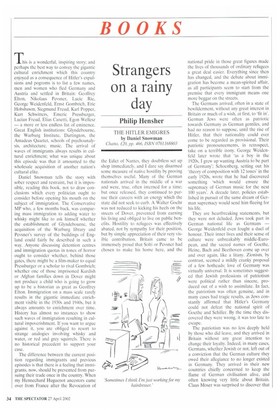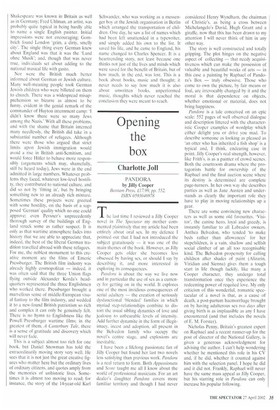Strangers on a rainy day
Philip Hensher
THE HITLER EMIGRES by Daniel Snowman
Chatto, £20, pp. 466, ISBN 0701168803
his is a wonderful, inspiring story; and perhaps the best way to convey the gigantic cultural enrichment which this country enjoyed as a consequence of Hitler's expulsions and pogroms is to list a few names, men and women who fled Germany and Austria and settled in Britain: Geoffrey Elton, Nikolaus Pevsner, Lucie Rie, George Weidenfeld, Ernst Gombrich, Eric Hobsbawm, Siegmund Freud, Karl Popper, Kurt Schwitters, Emeric Pressburger, Lucian Freud, Elias Canetti, Egon Wellesz — a more or less endless list of eminence. Great English institutions: Glyndebourne, the Warburg Institute, Dartington, the Amadeus Quartet, schools of psychoanalysis, architecture, music. The arrival of waves of immigrants always results in cultural enrichment; what was unique about this episode was that it amounted to the wholesale acquisition of another nation's cultural elite.
Daniel Snowman tells the story with sober respect and restraint, but it is impossible, reading this book, not to draw conclusions which every politician ought to consider before opening his mouth on the subject of immigration. The Conservative MP who, a few months back, was comparing mass immigration to adding water to whisky might like to ask himself whether the establishment of Glyndebourne, the acquisition of the Warburg library and Pevsner's survey of the buildings of England could fairly be described in such a way. Anyone discussing detention centres and immigration quotas in tones of horror ought to consider whether, behind those gates, there might be a film-maker to equal Pressburger or a scholar to rival Gombrich; whether one of those imprisoned Kurdish or Afghan families down in Dover might not produce a child who is going to grow up to be a historian as great as Geoffrey Elton. Immigration on a mass scale rarely results in the gigantic immediate enrichment visible in the 1930s and 1940s, but it always amounts to enrichment over time. History has almost no instances to show such waves of immigration resulting in cultural impoverishment. If you want to argue against it, you are obliged to resort to strange analogies involving whisky and water, or red and grey squirrels. There is no historical precedent to support your case.
The difference between the current position regarding immigrants and previous episodes is that there is a feeling that immigrants, now, should be prevented from pursuing their trade once in the country. When my Hennechard Huguenot ancestors came over from France after the Revocation of the Edict of Nantes, they doubtless set up shop immediately, and I dare say disarmed some measure of native hostility by proving themselves useful. Many of the German nationals arrived in the middle of a war and were, true, often interned for a time; but once released, they continued to pursue their careers with an energy which the state did not seek to curb. A Walter Goehr was not reduced to kicking his heels on the streets of Dover, prevented from earning his living and obliged to live on public benefits. Hostility to refugees was effectively abated, not by sympathy for their position, but by simple appreciation of their very visible contribution. Britain came to be immensely proud that Solti or Pevsner had chosen to make his home here, and the national pride in those great figures made the lives of thousands of ordinary refugees a great deal easier. Everything since then has changed, and the debate about immigration has become a mean-spirited affair, as all participants seem to start from the premise that every immigrant means one more beggar on the streets.
The Germans arrived, often in a state of bewilderment, without any great interest in Britain or much of a wish, at first, to 'fit in'. German Jews were often as patriotic towards Germany as German gentiles, and had no reason to suppose, until the rise of Hitler, that their nationality could ever come to be regarded as provisional. Their patriotic pronouncements, in retrospect, take on a terrible irony. George Weidenfeld later wrote that 'as a boy in the 1920s, I grew up wanting Austria to be part of Germany'; Schoenberg, setting out his 'theory of composition with 12 tones' in the early 1920s, wrote that he had discovered something 'which would ensure the supremacy of German music for the next 100 years'. A decade later, policies established in pursuit of the same dream of German supremacy would send him fleeing for his life.
They are heartbreaking statements, but they were not deluded. Jews took part in German national life as Germans — George Weidenfeld even fought a duel of honour. Their inner lives and their sense of culture were unbreakably middle-European, and the sacred names of Goethe, Heine, Bach and Beethoven come up over and over again, like a litany. Zionism, by contrast, seemed a mildly cranky proposal of a few hotheads: love of Germany was virtually universal. It is sometimes suggested that Jewish professions of patriotism were political rather than sincere, produced out of a wish to assimilate. In fact, the patriotism was often genuine, and in many cases had tragic results, as Jews constantly affirmed that Hitler's Germany could not defeat the national spirit of Goethe and Schiller. By the time they discovered they were wrong, it was too late to escape.
The patriotism was no less deeply held by those who did leave, and they arrived in Britain without any great intention to change their loyalty. Indeed, in many cases, Germans, whether Jewish or not, left out of a conviction that the German culture they owed their allegiance to no longer existed in Germany. They arrived in their new countries chiefly concerned to keep the flame of German civilisation alive, and often knowing very little about Britain. Claus Moser was surprised to discover that Shakespeare was known in Britain as well as in Germany; Fred Uhlman, an artist, was probably quite typical in being hardly able to name a single English painter. Initial impressions were not encouraging; Gombrich found London `grim, a dirty, smelly city'. The single thing every German knew about England was that it was the 'Land ohne Musik'; and, though that was never true, individuals set about adding to the national musical life with gusto.
Nor were the British much better informed about German or Jewish culture. Many well-meaning people took German Jewish children who were billeted on them to church. There was a widespread misapprehension so bizarre as almost to be funny, evident in the genial remark of the commander of Huyton internment camp: 'I didn't know there were so many Jews among the Nazis.' With all these problems, and with the shame that Britain interned many needlessly, the British did take in a substantial number of refugees. Although there were those who argued that strict limits upon Jewish immigration would avoid a rise in British anti-Semitism, and would force Hitler to behave more responsibly (arguments which may, shamefully, still be heard today), Jews were in the end admitted in large numbers. Whatever problems they faced, whatever low-level hostility, they contributed to national culture. and did so not by 'fitting in', but by bringing something new to an already rich mixture, Sometimes these projects were greeted with some hostility, on the basis of a supposed 'German' quality which no one could approve; even Pevsnees unprecedently thorough survey of the buildings of England struck some as rather suspect. It is only as that wartime atmosphere fades into history that we are able to appreciate that, indeed, the best of the liberal German tradition travelled abroad with these refugees. For me, the noblest monument to this creative moment are the films of Emeric Pressburger. The British film industry was already highly cosmopolitan — indeed, it was often said that the three Union flags flying outside Alexander Korda's headquarters represented the three Englishmen who worked there. Pressburger brought a marvellous sense of middle-European visual fantasy to the film industry, and wedded it to a new-found British patriotism so rich and complex it can only be genuinely felt. There is no hymn to Englishness like the Powell/Pressburger wartime films; in the greatest of them. A Canterbury Tale, there is a sense of gratitude and discovery which will never fade.
This is a subject almost too rich for one book, but Daniel Snowman has told the extraordinarily moving story very well. He sees that it is not just the great creative figures who matter here but the ordinary lives of ordinary citizens, and quotes amply from the memories of unhistoric lives. Sometimes it is almost too moving to read; for instance, the story of the 14-year-old Karl Schwander, who was working as a messenger boy at the Jewish organisation in Berlin which arranged the transportation of children. One day, he saw a list of names which had been left unattended in a typewriter, and simply added his own to the list. It saved his life, and he came to England, his name changed to Charles Spencer. It is a heartrending story, not least because one thinks not just of the lives and minds which were saved for the benefit of Britain, but of how much, in the end, was lost. This is a book about books, music and thought; it never needs to say how much it is also about unwritten books, unperformed music, thoughts which never reached the conclusion they were meant to reach.



































































 Previous page
Previous page